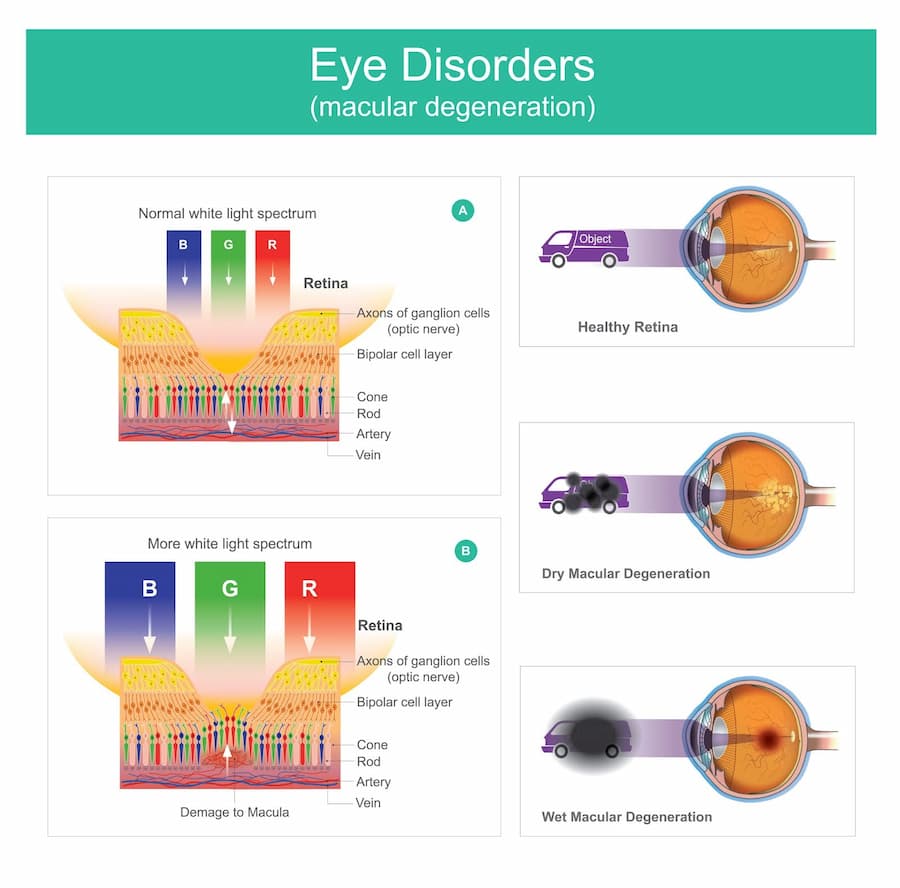Macular degeneration is a progressive blinding disease that affects central vision in the elderly population. This visual impairment affects a person’s ability to drive, read, and recognize familiar faces due to the breakdown of inner layers of the macula. Macular degeneration affects both men and women, though women are 1.3 times more at risk of developing MD. There is no cure for the disease; however, stem cell therapy for macular degeneration offers hope for patients with limited treatment options.
Stem cells are unspecialized cells found within all living organisms with the ability to improve symptoms, slow down disease progression, and delay disability. These cells release growth factors that help heal and regenerate damaged or diseased cells within the infected region.
Let’s look at macular degeneration, its types, causes, symptoms, potential advantages, and promises of stem cell therapy for macular degeneration.

What is Macular Degeneration
Macular degeneration is an age-related retinal condition affecting 196 million people across the globe. MD is characterized by the accumulation of extracellular deposits called drusen alongside progressive degeneration of photoreceptors and adjacent corneal tissues. This condition can affect either one or both eyes with varying levels of severity.
Types and Causes of Macular Degeneration
MD has two types depending on the rate of progression and severity.
Dry MD
Dry MD progresses slowly and affects about 80-90% of the population. It is characterized by the thinning of the macula and drusen buildup under the retina.
Wet MD
Wet MD leads to severe vision loss and affects around 10-20% of the population. It is characterized by abnormal growth of blood vessels under the retina, leading to retinal damage as a result of blood or fluid leakage.
Causes
The exact cause of macular degeneration is still unknown; however, it can be a combination of the following factors.
- Genetics: Having a blood-relative with MD can increase your chances of inheriting this condition.
- Genetic mutations: Mutations in the complement factor H gene and age-related maculopathy susceptibility two gene are associated with a higher risk of MD.
- Environmental and lifestyle factors: Age, smoking, diet, obesity, and UV damage can increase the risk of developing MD.
- Health-related factors: Hypertension, cholesterol, chronic inflammation, oxidative stress, and lack of antioxidants can contribute to MD.
- Race: Caucasians are at far greater risk of developing AMD compared to African Americans and Asians.
- Gender: Women are more at risk of developing MD than men.
- Eye color: People with lighter eye colors are at a higher risk of developing MD due to lower levels of retinal protective pigment.
Get a free online consultation
Contact us to learn whether stem cell therapy will work for your case.

Medical Advisor, Swiss Medica doctor
Symptoms of Macular Degeneration
Macular degeneration can produce the following symptoms:
- Blurred or distorted vision
- Loss of central vision
- Difficulty in vision due to dim lighting
- Changes in color perception
- Blank or dark spots in the field of vision
How to Diagnose Macular Degeneration
Diagnosing MD involves eye examinations and diagnostic tests, for instance:
- Amsler grid test: To identify MD as a result of distortions and blind spots within the central vision.
- Dilated eye exam: To detect the presence of drusen, pigment changes, and other abnormalities in the retina.
- Indocyanine green angiography: To detect the growth of abnormal blood vessels in cases where fluorescein angiography is indecisive.
- Optical coherence tomography: To provide detailed images of the layers of the retina and observe areas with swelling, thinning, or abnormal growth of blood vessels.
- Fluorescein angiography: To identify leaking of fluids or blood and abnormal blood vessels associated with wet age-related macular degeneration.
- Fundus photography: To observe the appearance of the macula and monitor changes over time.
- Fundus autofluorescence: To assess the condition of retinal pigment epithelial (RPE) and detect early symptoms of geographic atrophy in dry AMD.
Can Stem Cell Therapy Help Macular Degeneration Patients
Stem cells for macular degeneration hold great potential for treating MD, particularly age-related macular degeneration. Commonly used stem cells for MD include:
- Embryonic stem cells for their ability to differentiate into any cell type, including retinal pigment epithelium cells.
- Induced pluripotent stem cells for their ability to differentiate into RPE cells (retinal pigment epithelium) when reprogrammed into an embryonic-like state.
- Mesenchymal stem cells for their regenerative and anti-inflammatory properties.
Here’s how stem cell therapy for macular degeneration helps MD patients:
- Stem cell-derived RPE cells can replace damaged RPE cells in the retina, improving photoreception and vision.
- MSCs secrete growth factors, like cytokines, that help reduce inflammation, promote cell survival, and repair retinal tissues.
- Stem cells are also currently being researched for differentiation into photoreceptor cells, which have been lost due to MD.
Stem cell research for macular degeneration is ongoing, with scientists exploring the potential of using stem cells to regenerate damaged retinal cells and restore vision.
Indications and Contraindications for Stem Cell Therapy In Macular Degeneration
Macular Degeneration Stem cell treatment mainly targets patients with severe vision loss. Specific indications include:
- Patients with advanced dry MD and severe vision loss
- Patients with wet age-related MD and rapid vision loss
- Patients with Stargardt disease
- Patients with other retinal diseases
Patients with the following contraindications are not suitable for the macular degeneration stem cell treatment:
- Active ocular infections
- Severe systemic conditions
- Immunosuppression
- Allergies to local anesthetics
- Pregnancy or breastfeeding
- Previous retinal treatments
- Psychological conditions

Macular Degeneration Stem Cells Treatment Program In Swiss Medica
At Swiss Medica, the treatment for MD is based on the use of adult mesenchymal stem cells. We follow the next steps in order to prepare each program individually:
- Initial consultation to review medical history, conduct a comprehensive eye exam, and determine patient’s eligibility for performing the stem cell research for macular degeneration treatment.
- Detailed discussion on the treatment process, benefits, associated risks, and other alternatives.
- Providing informed consent for the treatment.
- Injecting SVF (stromal vascular fraction also known as fat tissue rich in stem cells) or donor cells into the periorbital fat to improve regeneration.
- Using local anesthesia to perform macular degeneration stem cell therapy, where stem cells are injected.
- Monitoring for postoperative complications, like bleeding or infection.
- Taking medications like antibiotics to avoid infections and reduce swelling.
- Support and rehabilitation via vision aids and occupational therapy for an independent life.
Where Can I Get Stem Cell Treatment for Macular Degeneration?
In order to get treatment of macular degeneration with stem cells, you need to consult specialists, explore specialized clinics offering stem cell therapy, reach out to healthcare networks for referrals, and discuss your options with the healthcare team for guidance.
Here are major advantages to make your choice in favor of Swiss Medica clinic:
- Free pre-treatment consultation to get the answers and resolve concerns;
- Personalized treatment plan adjusted to your condition and treatment goals;
- Convenient location in Serbia with direct flights from major cities and countries;
- Medical team with a profound experience in regenerative medicine;
- Comfortable clinic equipped with all necessary medical facilities;
- Travel assistance and medical guidance;
- After-treatment care and monitoring;
- Strict quality control at every step of the stem cell therapy for macular degeneration;
- In-house laboratory ensuring precise dosing of fresh stem cells;
- Variety of stem cell types and administration methods;
- Positive feedback from our patients reporting improvements in their symptoms.
The Advantages of our Macular Degeneration Stem Cell Treatment
Treatment of macular degeneration with stem cells offers several advantages over traditional treatment options, such as:
- Regeneration of retinal cells to improve or restore vision
- Addressing underlying symptoms of the disease
- Potential for long-term benefits and lesser need for ongoing treatments
- Versatility for treating both wet and dry types of MD
- Lesser need for other interventions
- Individualized condition-specific therapies for a reduced risk of immune rejection
- Improved functionality for regular activities and enhanced quality of life
Cost of Stem Cell Therapy for Macular Degeneration
The cost of stem cell therapy for macular degeneration ranges from 10.000 to 25.000 euros, the final price depends in the following factors:
- Type of stem cell therapy, such as autologous and allogeneic
- Source of cells such as bone marrow, adipose tissue, and umbilical cord
- Complexity of the stem cell procedure, including technique and preparation method
- Post-treatment monitoring to avoid complications
- Number of treatments required
Some other factors affecting the cost can include:
- Diagnostic tests, such as CT scans and MRI
- Follow-up visits and monitoring tests
- Geographic location of the healthcare facility.
You can consult our stem cell specialists at the Swiss Medica Clinic to understand the pricing, indications, and anticipated outcomes of stem cell therapy for macular degeneration. The doctor will determine the necessary procedures, which will influence the overall cost. Prices at Swiss Medica tend to be on the lower side and range from €7,000 to €25,000.
Contact us
Contact us to learn whether stem cell therapy will work for your case.

Medical Advisor, Swiss Medica doctor
List of References
Ma, H. H., & Liutkevičienė, R. (2021). Age-related macular degeneration: what do we know so far? Acta medica Lituanica, 28(1), 36.doi: 10.15388/Amed.2021.28.1.7
What is macular degeneration? (2024, February 18). American Academy of Ophthalmology. https://www.aao.org/eye-health/diseases/amd-macular-degeneration
Vyawahare, H., & Shinde, P. (2022). Age-related macular degeneration: Epidemiology, pathophysiology, diagnosis, and treatment. Cureus, 14(9). DOI: 10.7759/cureus.29583
Macular degeneration: Advances in stem cell and gene therapy | Aging | Eyes and Vision | UT Southwestern Medical Center. (n.d.). https://utswmed.org/medblog/amd-stem-cell-gene-therapy/
Pros and Cons | Stem cells | University of Nebraska Medical Center. (n.d.). https://www.unmc.edu/stemcells/educational-resources/prosandcons.html
Driscoll, D., Farnia, S., Kefalas, P., & Maziarz, R. T. (2017). Concise review: the high cost of high tech medicine: planning ahead for market access. Stem Cells Translational Medicine, 6(8), 1723-1729. doi: 10.1002/sctm.16-0487
Haseltine, W. A. (2023, August 16). Eyeing a Cure: Stem cell treatments for macular degeneration. Forbes. https://www.forbes.com/sites/williamhaseltine/2023/08/11/eyeing-a-cure-stem-cell-treatments-for-macular-degeneration/?sh=3d16ea117f18
MD, Pediatrician, Regenerative Medicine Specialist







